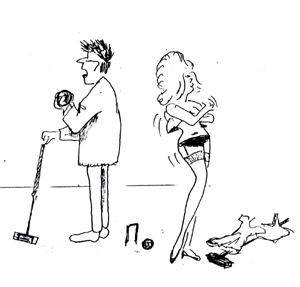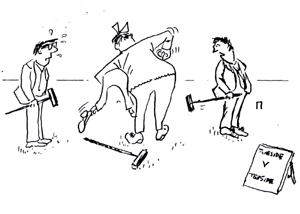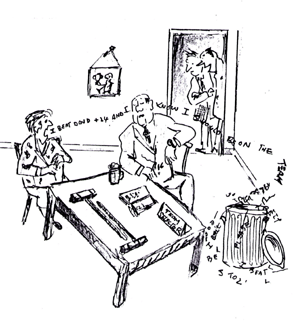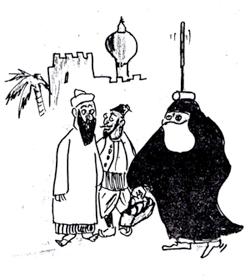

|
Back to |
| The Front Page |
| Letters & Opinion |
|
Should the World Croquet Federation promote a World Championship for Women? |
|
|
by Gail Curry, Miranda Morgan, and Liz Fleming, with Bob Alman illustrations by Jack Shotton posted May 4, 2010
|
|
This article - consisting mainly of four points of view - follows a controversial split vote of the World Croquet Federation Management Committee to authorize a Women's World Championship in Association Croquet. The story could be regarded as PART II of our Editors' Forum published 14 years ago, when this magazine was new and sassy, entitled "Why Women Don't Compete." The World Croquet Federation was not then as well organized and firmly established as it is now, and producing the World Association Croquet Championship and the new Golf Croquet World Championship as the price of Egypt's admission to the world body was taxing enough, in itself. But now the WCF has responded to many proposals for new events, and none is more troubling to many women than the Women's World Championship in Association Croquet. When Gail Curry, editor of the English Croquet Gazette, suggested a second Forum focused on this question, I gladly complied, and we asked a number of women prominent in the sport to contribute, several of whom declined, for various reasons. In addition to the viewpoints expressed below, all our readers are invited to post directly to our READERS FORUM.
Should the World Croquet Federation establish and promote a Women's World Championship in Association Croquet, with the proviso that there will be no parallel men's event?
It's an undeniable fact that major championships for top-ranked players selected on the basis of world rankings are virtual men's events, sometimes with not a single female competing, always with no more than a small and virtually invisible minority of women participants. The presence of only three women in the top 100 reflects this 21st Century reality. At the same time, more than half the membership of the croquet associations throughout the world (with national variations) are female.
| THE MAIN ALTERNATIVES |
|
|
One argument among many made recently on the Nottingham Board (the main croquet email newsgroup) that struck me most forcefully I will summarize like this: Women have a more rational, balanced, and enlightened attitude towards sports and games than men; women persist in treating games as a medium for expressing relationship; while men - single-mindedly, madly, obsessively - pursue the one goal of vanquishing the opponent. Which, if you think about it, actually is a little loony, and does explain rather neatly the paucity of women at the top of the rankings. They're not at the top of the rankings because for women, the game's the thing, not the victory. They're not at the top or the rankings, in short, because - in the main - they're not that interested in winning.
If women - make that MOST women - aren't that interested in winning, why should local, national, or international bodies worry about them as a class of "disadvantaged" players? Why not treat them as individuals - precisely what the few female champions (individualists by definition) in this worldwide conversation seem to be demanding? The alternative is to treat the paucity of female champions of the sport as a "problem." But it's a problem ONLY if you take the typical male point of view, which assumes that WINNING is the most important thing.
If winning or losing is the test of male/female parity in the sport, there is definitely something wrong in the croquet world, and croquet organizations at every level should try to "correct" the imbalance - perhaps by counter-balancing in the opposite direction: taking an action that clearly favors women and disfavors men, but with a view to redressing the sins of the past.

I'm sorry, Gloria, You're not good enough to play for the team... and I can't think of anything you could say or do that would make me change my mind.... |
Women are a "minority" (from the standpoint of civil rights and access to society's main institutions) whose grievances have been substantially redressed primarily through "equality" measures attained by law and supported by the courts: the right to vote, access to the professions formerly reserved for men only, parity in pay scales, and all the rest. Occasionally, the principle of Affirmative Action has been applied to women as well as racial minorities, in the form of quotas for public service hires and in unionized jobs.
The battle between social conservatives and liberal progressives will undoubtedly continue indefinitely - or until the "minorities" are no longer seen as oppressed or disadvantaged classes within society and thus disappear as identifiable minorities.In the meantime, why should not the principal of Affirmative Action be applied to the issue of whether there should be a Women's World Championship in croquet - ANY form of croquet - without the necessity of creating the hobgoblin of a parallel Men's Championship?
If you're any kind of conservative, you will (by definition) argue for no change at all of the status quo. If you're a liberal progressive - someone who wants to correct the errors of the past and believes that everyone should be interested in doing just that - you will likely favor instituting a Women's World Championship as an Affirmative Action.
As for the very relevant question, "Do women want a separate championship?" the best way to find out the answer may be to promote and produce one. The answer will be in the numbers and quality of the registration. If the numbers alone are sufficient to warrant it, that demonstrates demand sufficiently to produce another one - in one, two, three, or four years. And social conservatives should applaud the notion of letting the market rule, so perhaps we've now neutralized the political polarity by coming down squarely in the middle:
- Affirmative Action to create a Women's World Championship (with no parallel men's event);
- The ultimate market test of its viability, as measured in the attendance.
- Bob Alman, Founding and Managing Editor
CROQUET WORLD ONLINE MAGAZINE
Gail Curry asks:
Should the World Croquet Federation establish and promote a Women's Association Croquet World championship, with no obligation to create a parallel Men's event?
Simple answer: No. We need to examine the wider issues and find a way to redress the imbalance in a sport that promotes itself by stating that women and men play on equal terms.
It is undeniable that the major croquet championships are virtual male domains, but by offering to address the obvious imbalance of a sport so lacking in top female players by simply creating a World Championship for women only, in my opinion we lose the fairly unique status of the promotional ethos of the sport, that women and men play on equal terms. And we risk alienating male players who see the possibility of women having two bits at the cherry as an unfair advantage.
It's my opinion that women do not want to be seen as being given something that would in effect be a second class event, as anyone winning the said event would never be accepted within the croquet fraternity as a true World Champion; as the winners would know, as would everyone else, that they were not the best in the world, only the best in the world for their particular gender. Is that a World Championship in the truest sense? How many countries could and would be willing to support players to attend the event, which if it takes place is to be hosted in the Australasian Continent?
The original proposal for the Championship has put the state of women's croquet on the agenda, but should the WCF respond so quickly to a proposal made by a man? What was his agenda, I wonder? As half the croquet playing members worldwide are women, shouldn't we be consulted on this to see if we really want it? I and nine other UK women were consulted, albeit hurriedly by the Croquet Association, and I'm not sure that was a big enough sample, but at least we had the opportunity to be heard. Have other nationalities had the same courtesy paid to them by their Governing bodies?
Bob Alman suggests, as do others, that affirmative action should be taken, and that producing the Championship would provide a test of its viability as measured in the attendance. I disagree. Has anyone considered the impact of an event that is determined to be not viable because of a lack of attendance? Would that further dampen the confidence of women, and even perhaps reflect on the associations who did not support their players in competing?

|
I'm aware that taking this approach will take more time than holding a World Championship, but I believe this research would be a wise investment. I'm sure that within each association there would be women interested in undertaking the research and finding that, in itself, an empowering experience. And yes, I'd be willing to put my money where my mouth is. I believe that this course of action would benefit a far wider number of people than the 80 or fewer a World Championship would attract. The WCF Development Policy states it "will positively support the planning and development of croquet - in the pursuit of excellence!"
So here is my proposal to the WCF: Support research into why half of your membership are not attaining excellence, and help to preserve the ethos that men and women play croquet on equal terms.
- Gail Curry, England
Editor, Croquet Gazette
Miranda Morgan asks:
Will creating a Women's World Championship work to improve women's play?
Short answer: No.
The feedback I heard from the WCF Women's Golf Croquet World Championship was that it had a great atmosphere and was very social as an all-women event, and 'wouldn't it be great to have a women's WCF Association Croquet event?'. If the aim is to have a social, all-women atmosphere, then more women's events are needed. If the aim is to improve women's croquet and bring more women into the top 100 or make the women more competitive with the men, then segregating the men and women will not help. Croquet is one of the few sports where men and women can compete against each other. Offering a women's only WCF event will act to create a hurdle that will be harder in the long term to break back down. Croquet is so far ahead of most other sports - let's keep it that way.
If the proposed WCF Women's World Championship (Association Croquet) is designed with the aim of developing women's croquet, then don't call it a world championship. By offering multiple WCF World Championships, the prestige of the actual WCF World Championship is lost. The current WCF World Championship is open to all players. Each country is allocated a number of places, depending on their playing strength (with the host nation sometimes getting a few extra). Every croquet player who plays in a ranking tournament is assigned an index, and it is completely up to the player what they do with that index. Through playing skill alone, their index (and grade) will rise, and they will be considered for selection for the World Championship, regardless of gender.

|
| She's wasting her time trying to persuade the manager to let her play for the team.... |
My view is that the top women players in the world are more interested in playing against the top men, while the lower-ranked women are more interested in an event which they can be selected for, catch up with friends and not have the pressure of playing the top men. The argument that women don't have the will to win the same as men do is completely invalid; if particular women do have the will to win just as much as men, then surely those women will want to compete with the men...? If they don't have the will to win, then why create a world championship for them?
While the facts are not in dispute - indeed there are only 3 women in the top 100 players in the world - croquet's biggest draw-card, for me, is the equal opportunity to compete against any other player, male or female. The WCF needs to find other ways to bring the women's standard of play up to that of the men.
Miranda Morgan
Australia Women's Champion, 2010
Liz Fleming asks:
Should there be segregation in major Association Croquet events produced by the World Croquet Federation?
The suggestion that women should be segregated into a World Association event of their own has been a hidden and festering carbuncle on our sport since 2005 and continues to cause fragmentation throughout the sport right down to the grass roots of our clubs. Grass root members must support our events; it is they who uphold the volunteer base and much of the financial viability of all our clubs and therefore our events. Yet we are currently promoting one message - genderless sport - whilst quietly trying to push the complete opposite - segregation of the sexes.
There has been no official transparency on the suggestion or founding reason offered for supporting segregation. No one has openly published a full proposal. The original proposal was thought by the WCF Management Committee to be...
"Whilst it was accepted that women were generally poorly represented amongst the top players in the world, there was no support for the proposal. It may be construed as patronizing and there are better ways of promoting women's play in the sport."
The WCF are charged with promoting and developing Croquet, and obviously that stretches to more than simply sanctioning a continuous string of events. There is already an Open Association Croquet World Championship and an Open Qualifier for those not fortunate enough to be selected by their home country. Every country holds National, Regional, Local and Club Events. There are already a plethora of events available which women can and do enter. So it is not more of the same that will promote and improve the standard or participation of a greater number of women into major international events. Taking a top-down approach is highly unlikely to have the desired result of raising the standard of play or encouraging greater international participation by women.
It is evident that those women most closely linked to a high ranked male player are the most successful and highest ranked amongst the women themselves. Is there a causal link? It would appear so.
There are "better ways" says the WCF. What other ways have been under consideration that do not resort to segregation?

Looks like you'll be stuck in looking after the kids again, Hamad. |
I suggest the WCF could look favorably on an Open World Mixed Doubles Event, which allows any female to play with any male. There are more female players in the southern hemisphere than anywhere else. These players would ALL have the opportunity and choice to play with anyone in the WORLD, and females around the world would have access and support that currently only a few of us are fortunate enough to have at our disposal.
Give all the women in the world the opportunity to experience and learn from high ranked male players - not just the fortunate few such as I (and one or two others we could mention). Let the male players experience what the women are capable of. Let all women experience their readiness to play at the top and be competitive with the men. Challenge the men to openly share their knowledge and experience with the women, too!
I believe this option would be more widely accepted by nations who have already voiced opposition to segregation, therefore affording this event (Open Mixed Doubles) future sustainability and a more realistic expectation of continuity and encouraging greater numbers of women to experience: international play, advanced tactics, improved ball movement options, and peeling break strategies. Women would experience the support and encouragement they so desperately need and crave in order to progress.
The success of WCF sanctioned events depends on sustainability. Events that readily transport around the world and encompass the greatest audience should be our first choice and produce the greatest benefit to ALL.
- Liz Fleming, Australia
Player in four WCF Open World Association Championships
Jack Shotton has been a croquet cartoonist for over twenty years and a player for much longer. His cartoons first found an audience in the Tyneside Croquet Club magazine, and then found their way into Taking the Bisque, The Croquet Gazette and the book The Lighter Side of Serious Croquet. He can be found happily squandering bisques with his indestructible Marland Mallet at most croquet venues in the North East of England.